Man Martin's Blog, page 200
May 3, 2012
Me Versus Freud: The Uncanny
 Sigmund Freud is my dear close personal friend, but somewhat obsessed with S-E-X, and not surprisingly, he says that the experience of the uncanny, which is different and more subtle than terrifying or horrifying, has to do with confronting repressed fears, usually sexual. He writes about the recurrent theme of losing one's eyes in the short story, "The Sandman," which I've never read, but I know there is indeed something particularly uncanny in this; I used to feel a little shudder of horror at a lullaby that ran in part, "Birds and the butterflies, pecking at his eyes." In one version of Cinderella, crows peck out an eye from each of the stepmother and stepsisters as they enter the church to watch Cinderella's wedding, and then upon their exit, return to eat the other eye. R Crumb's strangely bloodless eye sockets in as Eggs stares futiley at his paper creep us out, as does the lump of one eyeball descending the crow's throat. Freud, predictably, says this sort of thing represents castration anxiety, and, well, okay... what the hell, why not. You can't deny there's some sort of sexual revenge going on in Cinderella, and we needn't doubt that Crumb, who digs the toe-jam from the darkest corners of the id - incest, murder, canabalism, cacphagy (look it up) - might have a sexual subtext at work. But with respect to Dr. Freud (Siggy, we used to call him in grade school) I think he might be barking up the wrong complex.The German word for the uncanny is unheimlich, which means something like un-homely. When Dorothy tells Toto they're not in Kansas anymore, she's expressing the German idea of the uncanny. Freud does some brilliant etymological analysis leading to the conclusion that the root heimlich means both itself, "homely," and its opposite - "secret," and so unheimlich, also is its own antonym. The uncanny, for Freud, is the unfamiliar, which points us back to that which is familiar, but repressed.
Sigmund Freud is my dear close personal friend, but somewhat obsessed with S-E-X, and not surprisingly, he says that the experience of the uncanny, which is different and more subtle than terrifying or horrifying, has to do with confronting repressed fears, usually sexual. He writes about the recurrent theme of losing one's eyes in the short story, "The Sandman," which I've never read, but I know there is indeed something particularly uncanny in this; I used to feel a little shudder of horror at a lullaby that ran in part, "Birds and the butterflies, pecking at his eyes." In one version of Cinderella, crows peck out an eye from each of the stepmother and stepsisters as they enter the church to watch Cinderella's wedding, and then upon their exit, return to eat the other eye. R Crumb's strangely bloodless eye sockets in as Eggs stares futiley at his paper creep us out, as does the lump of one eyeball descending the crow's throat. Freud, predictably, says this sort of thing represents castration anxiety, and, well, okay... what the hell, why not. You can't deny there's some sort of sexual revenge going on in Cinderella, and we needn't doubt that Crumb, who digs the toe-jam from the darkest corners of the id - incest, murder, canabalism, cacphagy (look it up) - might have a sexual subtext at work. But with respect to Dr. Freud (Siggy, we used to call him in grade school) I think he might be barking up the wrong complex.The German word for the uncanny is unheimlich, which means something like un-homely. When Dorothy tells Toto they're not in Kansas anymore, she's expressing the German idea of the uncanny. Freud does some brilliant etymological analysis leading to the conclusion that the root heimlich means both itself, "homely," and its opposite - "secret," and so unheimlich, also is its own antonym. The uncanny, for Freud, is the unfamiliar, which points us back to that which is familiar, but repressed.
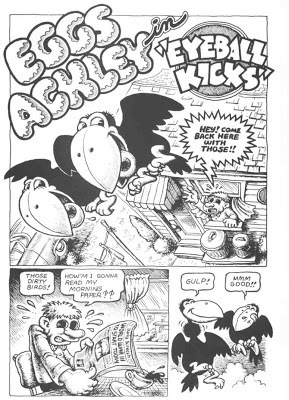 This is all well and good, but the English word for uncanny is not unheimlich, it's uncanny, and uncanny's roots mean, not un-homely, but un-known, or more like un-encountered. (I won't use unfamiliar because the root familial lends support to Freud's thesis.) I think it's this measure of un-knowledge that constitutes the uncanny, and here I'm going to use Freud's own ideas against him. One of our developmental stages is the acquistion of the reality principle: we learn that the world won't give us what we want all the time, but that if we can conform our behavior and expectations to the way the world works, we'll get at least some of what we want, some of the time. This principle rests on the bedrock that reality is a real thing, that it is rule-bound and to a large degree predictable. But what if the world isn't that way? There's no reason why it should be, after all: reason itself, which justifies so many other things, can't be justified by reason. What if the world isn't reasonable, what if it's irrational and crazy? What if it's unknowable, un-encounterable, in short: uncanny?That's why I think the thought of losing our eyes is so troubling: it isn't that they represent gonads, it's that they represent the ability to know. When someone grasps an idea, he has an "insight," when he explains it to us, we "see what he means." There's a children's story that always troubled me, not in spite of its ridiculous ending, but because of it. A normally well-behaved brother and sister meet a gypsy girl who offers them a magical toy if they will misbehave at home. In spite of the love they have for their mother, they do so, causing her great grief. (The father is evidently dead.) But the gypsy refuses to give them the toy because they haven't been "bad enough" yet, and so the siblings get into worse and worse antics, and the mother warns them, tearfully, if they keep it up, she will leave them and be replaced with another mother, one with a wooden tail and glass eyes. (There's those eyes again!) But the children don't listen, and finally do something so terrible, they're convinced the gypsy child will give them the toy. They run off to meet her, but she isn't there. They wait until the sun sets, but she never returns. They go back home, disappointed and uneasy. As they approach their house in the darkness, through the window, they catch sight of their new mother's glass eyes glinting in the firelight and they hear her wooden tail dragging on the floor.
This is all well and good, but the English word for uncanny is not unheimlich, it's uncanny, and uncanny's roots mean, not un-homely, but un-known, or more like un-encountered. (I won't use unfamiliar because the root familial lends support to Freud's thesis.) I think it's this measure of un-knowledge that constitutes the uncanny, and here I'm going to use Freud's own ideas against him. One of our developmental stages is the acquistion of the reality principle: we learn that the world won't give us what we want all the time, but that if we can conform our behavior and expectations to the way the world works, we'll get at least some of what we want, some of the time. This principle rests on the bedrock that reality is a real thing, that it is rule-bound and to a large degree predictable. But what if the world isn't that way? There's no reason why it should be, after all: reason itself, which justifies so many other things, can't be justified by reason. What if the world isn't reasonable, what if it's irrational and crazy? What if it's unknowable, un-encounterable, in short: uncanny?That's why I think the thought of losing our eyes is so troubling: it isn't that they represent gonads, it's that they represent the ability to know. When someone grasps an idea, he has an "insight," when he explains it to us, we "see what he means." There's a children's story that always troubled me, not in spite of its ridiculous ending, but because of it. A normally well-behaved brother and sister meet a gypsy girl who offers them a magical toy if they will misbehave at home. In spite of the love they have for their mother, they do so, causing her great grief. (The father is evidently dead.) But the gypsy refuses to give them the toy because they haven't been "bad enough" yet, and so the siblings get into worse and worse antics, and the mother warns them, tearfully, if they keep it up, she will leave them and be replaced with another mother, one with a wooden tail and glass eyes. (There's those eyes again!) But the children don't listen, and finally do something so terrible, they're convinced the gypsy child will give them the toy. They run off to meet her, but she isn't there. They wait until the sun sets, but she never returns. They go back home, disappointed and uneasy. As they approach their house in the darkness, through the window, they catch sight of their new mother's glass eyes glinting in the firelight and they hear her wooden tail dragging on the floor.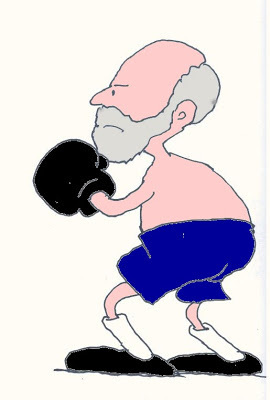 The ending isn't scary in the normal way - it's not as if the new mother shows any ability to harm them, it's just that it's so uncanny. It's illogical, it makes no sense, it isn't possible.
The ending isn't scary in the normal way - it's not as if the new mother shows any ability to harm them, it's just that it's so uncanny. It's illogical, it makes no sense, it isn't possible.Freud would say this is sexual too, and ok, if that's the way he wants it, but I'll cling to my notion that the uncanny has more to do with the potential for terrible unknowableness than the fear of a wiener-snipping. At the beginning of Night of the Living Dead a brother and sister are arguing as they visit their father's grave (Okay, Freud, shut up, you've had your say!) And in the background, way against the horizon, a shuffling figure meanders slowly, weaving in and out of our field of vision. He's so far off, we can barely see him. And we know, we just know, he's a zombie. It doesn't make sense that he should be, there's no reason for a dead person to be up and walking around - and that's what makes it uncanny. One more example, Gregor Samsa, as rule-bound and reality principled as any man who ever walked, wakes up from a troubled dream to find himself changed into a monstrous vermin. This is the uncanny and our peculiar horror of it. When we were very, very little we struck a bargain with the universe that we would be have reasonably in accordance with its reason, but what if the universe never kept its side of the deal, and after all, why should we expect it to? What if instead of an orderly if unsatisfactory clockwork of cause and effect, and this therefore that, and one-thing-at-a-time, it's a bedlam of eyeball-eating crows and mothers with glass eyes and wooden tails?
Published on May 03, 2012 02:31
May 2, 2012
Going With
 At my school a lot of people have started using "may" in the most bizarre way imaginable; when they make a request, instead of "Will you..." or ""Would you..." they'll say "May you..." as if they wanted to know if I had permission. I think they got it in their heads that "may" is a more polite word and so throw it in as a sweetener like artificial dessert topping on meatloaf. Many of these same people in another context drop F-Bombs until the conversation is a leveled and lifeless field fit only for cockroaches.
At my school a lot of people have started using "may" in the most bizarre way imaginable; when they make a request, instead of "Will you..." or ""Would you..." they'll say "May you..." as if they wanted to know if I had permission. I think they got it in their heads that "may" is a more polite word and so throw it in as a sweetener like artificial dessert topping on meatloaf. Many of these same people in another context drop F-Bombs until the conversation is a leveled and lifeless field fit only for cockroaches.Just when I thought "may you" was the most nerve-jarring abomination to offend my ears, someone came out with "go with," as in "I'm going to get some beer. You want to go with?" Unlike "may you," "go with" is used by the sort of people who ought to know better, the same group who used the maddening construction, "waiting on line." If you're one of these people, I apologize, but it really drives me berzerk. What the hell do you think you're saving by making people's heads twitch waiting for an object after the preposition? Like a lot of seemingly minor phrases, "go with" carries a large suitcase of unspoken meaning, "I'm too hip and casual to bother with unneccessary pronouns because my intention was clear the moment I reached 'with;' heck, I didn't even notice there was supposed to be a 'me' in there, but if it'll make you more comfortable, I'll insert a 'me' for you, if you're really that big a square, but wouldn't you really just rather hang out with a trend-setter like me who leaves out pronouns in such cool way and go with?"
I've been formulating a response for the next time someone springs a "go with" on me. Here's what I have so far:
"Want to go with?"
"No, I'd rather stay at."
"Want to go with?"
"Yes! Oh, wait. You mean with you. I was hoping you were talking about some other people."
"Want to go with?"
"Eat a large bowl of upchuck, you trend-sucking jackanapes!"
But I can't decide which one I like best. Can you?
Published on May 02, 2012 03:06
May 1, 2012
Franzen: Let Me Teach You How to Write Good
 Merle Franzen writes conspicuously at the downtown Chamblee StarBucks on Side Street (just across the other StarBucks on Side Street). He is the author of several self-published e-novels, an e-collection of poems, an e-cookbook, and is at work on an e-autobiography, tentatively titled E-Me.
Merle Franzen writes conspicuously at the downtown Chamblee StarBucks on Side Street (just across the other StarBucks on Side Street). He is the author of several self-published e-novels, an e-collection of poems, an e-cookbook, and is at work on an e-autobiography, tentatively titled E-Me.A lots of people ask me if I have any rules for writing, and over the months since I've been a dedicated novelist I've boiled the whole thing down to five simple principles.
1. If you run out of stuff to say, you can always have your main character or someone think about stuff. In my last e-novel, for instance, my main character Chet Barkesdale, Private Eye, spends twenty pages just thinking about what to do with all that lint that comes out of a dryer. And I tell you, it's fascinating! And when he stops thinking about that, he thinks for another ten pages thinking about the fact he's got nothing to think about. I could write stuff like that for weeks!
2. Write what you know. This is very important. For example, I try to base all of my characters off of me in some way. Like, you take Bart Chetsdale, Wild West Sheriff. He's exactly like me if I was a sheriff in the wild west and had been trained in secret Indian ways by Bear Breaks Wind, a full-blooded Pawnee medicine man and then taught to sling two six-shooters by "Bad Bob" Bobby Bad, the ornieriest six-shooter slinger ever to sling two six-shooters. And a lot of Bart's thoughts are just the sort of thing I think about all the time. Like dryer lint. Did you know it can be used for fuel? I held a match to some of that stuff, and it went off like, WHOOM! Singed off my eyebrows.
3. Always have a surprise ending. Nothing worse than a dull, predictable ending, which is why you got to be sure to do something different. For example, in my e-sci-fi thriller, after twenty pages thinking about stuff, Clarke Dalebeck, Starfleet Captain, foils the evil Nimrodians by throwing a flaming lint ball in their faces and burning off their eyebrows! No one saw that coming, boy!
4. Use plenty of exclamation marks! I don't know why more people don't do this!! You take an ordinary hum-drum sentence like: "Look at all that lint." You can make it a real hum-dinger by throwing some exclamation marks on it. "Look at all that lint!!!!" CAPITALIZING EVERYTHING WORKS, TOO!!!
5. If you completely run out of ideas for story, take something someone's already written and do a word search, replacing out all the names of stuff with whatever you want. I've already written several e-masterpieces this way: "The Lint of Mount Kilamanjaro," "Moby Lint," and "Checksbeck of the D'Urberlint."
Published on May 01, 2012 02:52
April 30, 2012
STOOPID CONTEST: April 30th
The STOOPID CONTEST: April 30th
Identify the movie title represented by the cartoon below? Send your guess, along with your name and address, to manmartin@manmartin.net One entry, chosen at random from the correct answers will receive an autographed copy of Paradise Dogs, hand delivered to your hovel or basement apartment by a PAID REPRESENTATIVE OF THE US GOVERNMENT.
He thinks he's a chicken. She can't spell "BMW."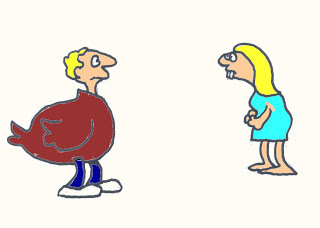 They were made for each other!
They were made for each other!
The previous contest was won by John Blair of Beaufort, South Carolina. John's proud of completing a jigsaw puzzle in just a couple of hours; the box said "five to seven years." John wins a copy of Endless Corvette.
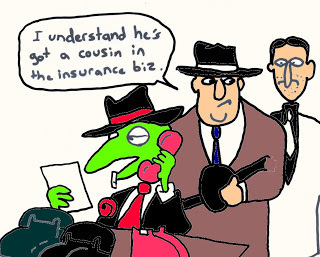 "... five-to-one on Lucky Lady at Belmont, six-to-one on Shoestring at Viaduct and ten-to-one on the Giants."
"... five-to-one on Lucky Lady at Belmont, six-to-one on Shoestring at Viaduct and ten-to-one on the Giants."
"The Lizard of Odds."
Identify the movie title represented by the cartoon below? Send your guess, along with your name and address, to manmartin@manmartin.net One entry, chosen at random from the correct answers will receive an autographed copy of Paradise Dogs, hand delivered to your hovel or basement apartment by a PAID REPRESENTATIVE OF THE US GOVERNMENT.
He thinks he's a chicken. She can't spell "BMW."
 They were made for each other!
They were made for each other!
The previous contest was won by John Blair of Beaufort, South Carolina. John's proud of completing a jigsaw puzzle in just a couple of hours; the box said "five to seven years." John wins a copy of Endless Corvette.
 "... five-to-one on Lucky Lady at Belmont, six-to-one on Shoestring at Viaduct and ten-to-one on the Giants."
"... five-to-one on Lucky Lady at Belmont, six-to-one on Shoestring at Viaduct and ten-to-one on the Giants.""The Lizard of Odds."
Published on April 30, 2012 02:30
April 29, 2012
Is It Time for Hummingbirds?
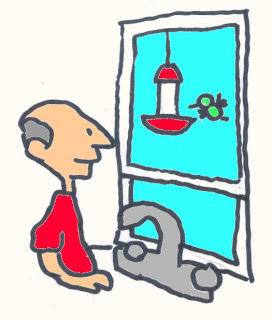 For several summers past, we've put out hummingbird feeders, and these little winged dynamos come right up to the kitchen window to dip their needle beaks and sip sugarwater. You have to watch closely because they're small and they're fast, but hummingbirds have the most beautiful iridescent green bellies, but even if you can't make out their bellies, watching them appear out of nowhere, hover, dip, sip, hover, dip sip, and then dart off into the distance, nothing of the wings but a blurry patch of air next to each shoulder, cannot fail to make the most careworn smile. Last winter we put out suet cages, and it took a while for the birds to discover to discover them, but once they did, we began getting the most marvelous profusion of birds, birds I never suspected we have around here. Now, with the days getting warmer, I wonder if it's time to go ahead and put out the hummingbird feeders, too. Think of it! Looking out the window as you put away the dishes to see hummingbirds, and catbirds, and mockingbirds, and finches, right on the other side of the glass. We have a bat, too, that I really only see this time of year, and the most spectacular woodpecker, that is so handsome, you really think he must be putting on. There's an owl, some mornings, making solemn owl noises. I wish I could put up something for them, too. A piece of buggy bark hanging from a string for the woodpecker perhaps, or a struggling live mouse for the owl, but some flying things won't come to the window on command, and you just have to hear them and see them when you can. In the meantime, I can make do with hummingbirds.
For several summers past, we've put out hummingbird feeders, and these little winged dynamos come right up to the kitchen window to dip their needle beaks and sip sugarwater. You have to watch closely because they're small and they're fast, but hummingbirds have the most beautiful iridescent green bellies, but even if you can't make out their bellies, watching them appear out of nowhere, hover, dip, sip, hover, dip sip, and then dart off into the distance, nothing of the wings but a blurry patch of air next to each shoulder, cannot fail to make the most careworn smile. Last winter we put out suet cages, and it took a while for the birds to discover to discover them, but once they did, we began getting the most marvelous profusion of birds, birds I never suspected we have around here. Now, with the days getting warmer, I wonder if it's time to go ahead and put out the hummingbird feeders, too. Think of it! Looking out the window as you put away the dishes to see hummingbirds, and catbirds, and mockingbirds, and finches, right on the other side of the glass. We have a bat, too, that I really only see this time of year, and the most spectacular woodpecker, that is so handsome, you really think he must be putting on. There's an owl, some mornings, making solemn owl noises. I wish I could put up something for them, too. A piece of buggy bark hanging from a string for the woodpecker perhaps, or a struggling live mouse for the owl, but some flying things won't come to the window on command, and you just have to hear them and see them when you can. In the meantime, I can make do with hummingbirds.
Published on April 29, 2012 03:30
April 28, 2012
Lord, I Love My Wife
 Nancy and I own a two-bedroom, one-bath condo we rent out. In typical brilliant Martin timing, we purchased this investment property right before the real estate market went ker-thud. Recently, the old tenant moved out, and Nancy and I had to repaint and rehab it a bit before renting it again. In truth, the old tenants left it in reasonably good shape, but no matter what, there's always work to be done. And it's always a lot more work than you anticipate. Since we both have full-time jobs, this neccessitates going over after work to paint, clean, and repair. A good word for the experience would be "fatiguing." There are lots of other good words for the experience, but I can't use them in a family-friendly blog.
Nancy and I own a two-bedroom, one-bath condo we rent out. In typical brilliant Martin timing, we purchased this investment property right before the real estate market went ker-thud. Recently, the old tenant moved out, and Nancy and I had to repaint and rehab it a bit before renting it again. In truth, the old tenants left it in reasonably good shape, but no matter what, there's always work to be done. And it's always a lot more work than you anticipate. Since we both have full-time jobs, this neccessitates going over after work to paint, clean, and repair. A good word for the experience would be "fatiguing." There are lots of other good words for the experience, but I can't use them in a family-friendly blog.I'd arrive after school - Nancy would have gotten there first and already be at work - change into my painting duds, and work as long as I could stand, and then a little bit longer. And then we'd go home and pass out. The next day we'd do it again.
I wish I could claim to be some sort of work-ethic superman with a hand for any fate, but the truth is, I'm just following Nancy's lead. It's not like she doesn't get tired, she gets exhausted, but she keeps on going. It's like that Kipling poem, "If you can force your heart and nerve and sinew, to serve your turn long after they are gone, and so hold on when there is nothing in you except the Will which says to them: "Hold on!"
Corny, I know, but that's Nancy to a T. I'd feel myself flagging and be just on the point of suggesting we pile some kerosene-soaked rags in a corner, hold a match to them, and file for insurance, and I'd see her plugging away, still at work, uncomplaining. I'd run out of things to do, but she always had a task at hand. She never bitched or said I wasn't doing enough, just worked as hard and steady as she knew how.
When I married her, I thought of her as a "girl." I never thought of her as a "lady." But I realize what I have on my hands - oh, lord what a marvel!- is a woman, and what a woman!
The other night she showed me her hands. She had literally rubbed her fingerprints off with cleaning - all she had on the pads of her fingers were red blisters. How can anyone be so tough, and at the same time so beautiful, kind, and good? Oh, Nancy, I love you.
Published on April 28, 2012 03:57
April 27, 2012
Patsy Cline's Lovesick Blues
I heard this song the other day on my IPod, and had to replay it three times in a row. I can’t explain why I love this song so much – and you probably won’t be able to explain why I’d love it either. It’s so wrong on so many levels. It’s not the Patsy Cline you think of, just singing the tar out of a song like “Crazy” or “Walking After Midnight,” but belting out a rockabilly version of a Hank Williams standard, and weird rockabilly, too. For a what's supposed to be a sad ballad, she just races through it, almost like she wants to get it over with – it doesn’t feel the least bit sincere that she’s heartbroken over anything. But my Lord, I just love it. Here it is.

Published on April 27, 2012 02:16
April 26, 2012
Author Hotties
Whenever I open my Yahoo account, there's always a banner of top stories featuring at least one photo gallery of some celebrity hottie modeling a see-through something-or-other or wearing a speedo on the beach at Cannes. Usually, I assume, a photo put up by their publicist, and I'm sure it works, too. For example, who the hell would care about Kim Kardashian if we weren't bombarded with photos of her every twenty two seconds, which is why I think we on the literary scene ought to try the same approach if we want to increase the number of readers out there. For example...
 When he's not writing novels, he's working on his six-pack says hot author, Salman Rushdie.
When he's not writing novels, he's working on his six-pack says hot author, Salman Rushdie.
 "Where are you going, where have you been?" Is what readers want to know after seeing fave short-story writer and novelist Joyce Carroll Oates model her new bikini top.
"Where are you going, where have you been?" Is what readers want to know after seeing fave short-story writer and novelist Joyce Carroll Oates model her new bikini top.
 Thought-provoking and booty-licious Canadian poet and author Margaret Atwood shows off her hand-made tail.
Thought-provoking and booty-licious Canadian poet and author Margaret Atwood shows off her hand-made tail.
 "America needs long, complex stories," claims beefcake novelist, Jonathon Franzen, but what we really need is more of you without a shirt. No "Corrections" needed here, Johnny! Rrrow!
"America needs long, complex stories," claims beefcake novelist, Jonathon Franzen, but what we really need is more of you without a shirt. No "Corrections" needed here, Johnny! Rrrow! 
 When he's not writing novels, he's working on his six-pack says hot author, Salman Rushdie.
When he's not writing novels, he's working on his six-pack says hot author, Salman Rushdie. "Where are you going, where have you been?" Is what readers want to know after seeing fave short-story writer and novelist Joyce Carroll Oates model her new bikini top.
"Where are you going, where have you been?" Is what readers want to know after seeing fave short-story writer and novelist Joyce Carroll Oates model her new bikini top. Thought-provoking and booty-licious Canadian poet and author Margaret Atwood shows off her hand-made tail.
Thought-provoking and booty-licious Canadian poet and author Margaret Atwood shows off her hand-made tail.  "America needs long, complex stories," claims beefcake novelist, Jonathon Franzen, but what we really need is more of you without a shirt. No "Corrections" needed here, Johnny! Rrrow!
"America needs long, complex stories," claims beefcake novelist, Jonathon Franzen, but what we really need is more of you without a shirt. No "Corrections" needed here, Johnny! Rrrow!
Published on April 26, 2012 02:36
April 25, 2012
Shakespeare and the L-Word
 Vonnegut said that everything in a story should contribute either to the plot or to characterization. With respect to the better craftsman, I wonder if he's going far enough. Take Wild Bill Shakespeare. How many words will he expend, say, on pure characterization? As far as I can tell, none. A woman in love with a man, seems an obvious and worthwhile bit of characterization. Is it permissable for a writer to let a wife say she loves her husband, purely by way of establishing the relationship? In Shakespeare, plenty of women tell men they love them, in plenty of different ways, but there's always something else at stake. They never say "I love you," unless they want something in return. (Much like real life in that way.) The L-Word in Shakespeare always comes with fine print - a "therefore."
Vonnegut said that everything in a story should contribute either to the plot or to characterization. With respect to the better craftsman, I wonder if he's going far enough. Take Wild Bill Shakespeare. How many words will he expend, say, on pure characterization? As far as I can tell, none. A woman in love with a man, seems an obvious and worthwhile bit of characterization. Is it permissable for a writer to let a wife say she loves her husband, purely by way of establishing the relationship? In Shakespeare, plenty of women tell men they love them, in plenty of different ways, but there's always something else at stake. They never say "I love you," unless they want something in return. (Much like real life in that way.) The L-Word in Shakespeare always comes with fine print - a "therefore."Juliet: I love you; therefore let's defy both our families and get secretly married.
Desdemona: I love you; therefore, please don't kill me because I swear I'm innocent of anything you think I might have done and later you'll hate yourself for it, I guarantee.
Lady Macbeth: I love you; therefore, you need to quite shilly-shallying and go kill Duncan because we won't ever get a sweeter opportunity than this if you ever want to be king of Scotland.
Portia: (In Julius Caesar, not Merchant of Venice) I love you; therefore, you need to spill the beans about what's been eating you, which I'd never say out loud, but I'm pretty sure you plan to ill-kay Aesar-Say, which you'll never get away with not in a million years, so think about it.
And men tell women they love them as well.
Richard: I love you; therefore, you should marry me, even though I'm physically repulsive and I killed your husband, whose body is right there in the coffin next to you, but in any case, I only killed him because I love you, as I already explained, and you should on no account suspect this is just a Machiavellian tactic on my part to bring me one step closer to the throne in a diabolical plot that will ultimately result in the deaths of almost the entire York family paving the way for someone named Henry whom no one has ever heard of until now.
These of course, are not actual lines, but generous paraphrases on my part.
It's not for nothing that the greatest writer in the English language was a dramatist. He knew if you really want to sell the popcorn, it's not enough for people to love each other. Stuff has to happen.
Published on April 25, 2012 02:38
April 24, 2012
Some thoughts on the Specialness of Writers
Just some thoughts about how great we writers are. Recorded live at Prairie Lights in Iowa City - thanks to my sweet sister Nettie and owner Jan Weismiller.

Published on April 24, 2012 02:41



